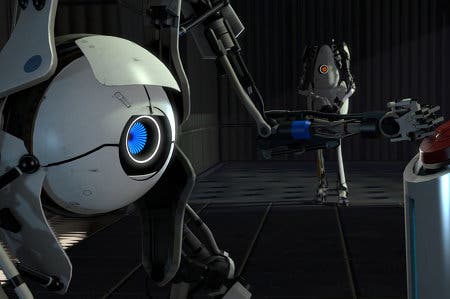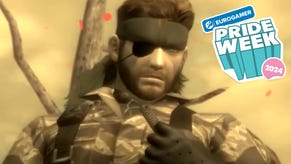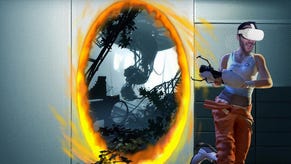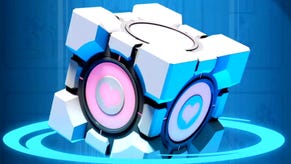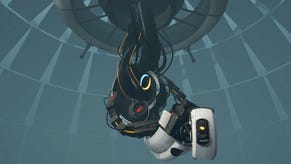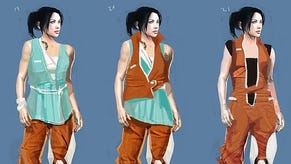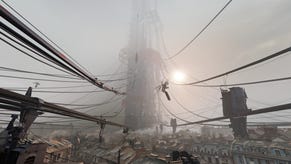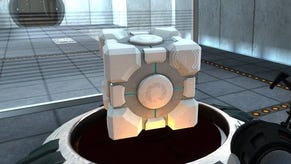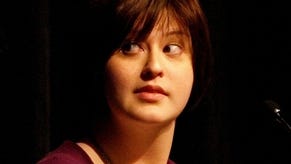Games of 2011: Portal 2
For science.
You can tell everything about Portal 2 from the lack of cake. There's one gag in the whole game, and it's a fakeout - a door marked 'cake dispensary' that, if approached, falls flat on the ground. Portal was too perfect and its punishment was death by meme, the inane chanting that transforms a joke into a catchphrase. Portal 2 doesn't preach to the converted and retread past glories - the cake doesn't matter. And nor does much else.
This is a sequel that does things differently. The extended opening is no more than a statement of intent, giving you a few rooms that could be from the original before bodily throwing Chell into a whole other scale of adventure. Portal was a small, perfectly formed solo trek with a subtle narrative - Portal 2 is a sprawling comedy with star voice talent, and a brilliant co-op game. The hints of Aperture Science from the first game expand into a gigantic, overgrown complex that's halfway between collapsing and eating itself, a dying machine filled with ghosts.
Only Valve could follow up minimalist narrative with an ensemble cast and a series of chattering companions. Instead of ruining Portal 2's world, they make it: Wheatley's there from your first steps to the very end credits, a hovering sphere with a mechanical eye. He doesn't seem the most obvious conduit for slapstick, but that little ball is animated like a body, his protuberances swishing like limbs and prone to clumsy jerks. Steven Merchant's babbling delivery and Bristolian vowels are the perfect counterpoint to the computer-filtered tones of Glados, and even though Wheatley's a monumental clown and kind of evil he's a great buddy.

But Merchant has the tools to work with. Portal 2's script puts every other AAA game to shame, veering between acid put-downs and monomaniacal soliloquies without missing a beat, setting up future jokes and somehow always keeping things moving. My favourite line comes after Wheatley's been boasting about reading Machiavelli ("Do not understand what all the fuss was about.") Some time later, he springs a very obvious trap: "Spinning blade wall - Machiavellian!" Not just a brilliant line at the right moment, it's also a little hint that Wheatley can't actually read.
There's even room for a little payback. One of the running themes is the various antagonists trying to undermine Chell's self-esteem by talking about her weight ("like an eagle... piloting a blimp"), leading to a series of ever-more idiotic variations on 'fatty' as they press for a reaction. Wonder where Valve got the idea for that from.
But clever and witty as single-player is, and there's so much more to it than Wheatley - Cave Johnson and his combustible lemons, the irresistible tones of Caroline, potato Glados - Portal 2 is at its best, and funniest, in co-op. It's a unique experience that creates the perfect conditions for communication and slapstick, then makes with the brilliant puzzles and puts each player's life in the hands of the other.
I never mean to - really - but I'm always killing partners: shooting them into spikes, turning off the hard light bridge halfway, pulling a lever that smashes them into the ceiling. But Portal 2 understands that these moments are where the laughs are, so there's no restarts or any other punishment for dying at all. In fact one of its bests rewards comes with the seemingly endless Glados quips about one player or the other's incompetence: "It would be pointless for either of us to hurt Blue's feelings. But it's clear to everyone monitoring the test who's carrying who here."
This makes for unforgettable co-op, the most consistently funny and carefully engineered I've played. You glory in the spectacle as P-body backflips through a spike chamber, or Atlas casually pops out of a portal to grab a cube mid-air, and then someone messes up and everything slams into a wall. You couldn't do the puzzles alone, but that's only half of it - you can't do it without communicating, without constantly badgering, cajoling and laughing with your buddy.
To emphasise all its differences risks making Portal 2 seem like a complete departure, but of course it managed this transformation while keeping a tight hold on the original concept. Despite the scale and the script this is still built around the same portals, and its additions always enhance that tool rather than trying to replace it. The way the gels layer on top of the puzzles in the final stretch, adding momentum and bounce to elaborate rabbit runs, results in some of the most dizzying, thrilling motion ever achieved in first-person.
Portal 2 never goes in awe of its forebear. It reinvents old puzzles, twisting them into its new form, and the last boss fight is a perfect example. Wheatley announces he's watched the video of how Chell beat Glados at the end of the last game, and based on that has removed all portal-able surfaces and bomb-proofed himself. You then use the new tools to beat him in exactly the opposite manner - where you were tearing cores off Glados at the end of Portal, you're sticking them onto Wheatley at the end of Portal 2. That little reference, the symmetry and the twist, is what every sequel should aspire to.
Portal 2 is so good because it took nothing for granted. In early development it didn't even have a portal gun. It builds a different kind of game - two kinds of game, really - out of its predecessor's nuts and bolts, shaking up the original's industrial chic by showing its greasy roots and acting as a conduit for human performances that put most other comedies to shame, never mind games. It's an incredible feat of world-building, a unique co-op experience, and most remarkably of all still has that same mechanic at its core. Portal was the little puzzler that could. But Portal 2 is the big one that did.
